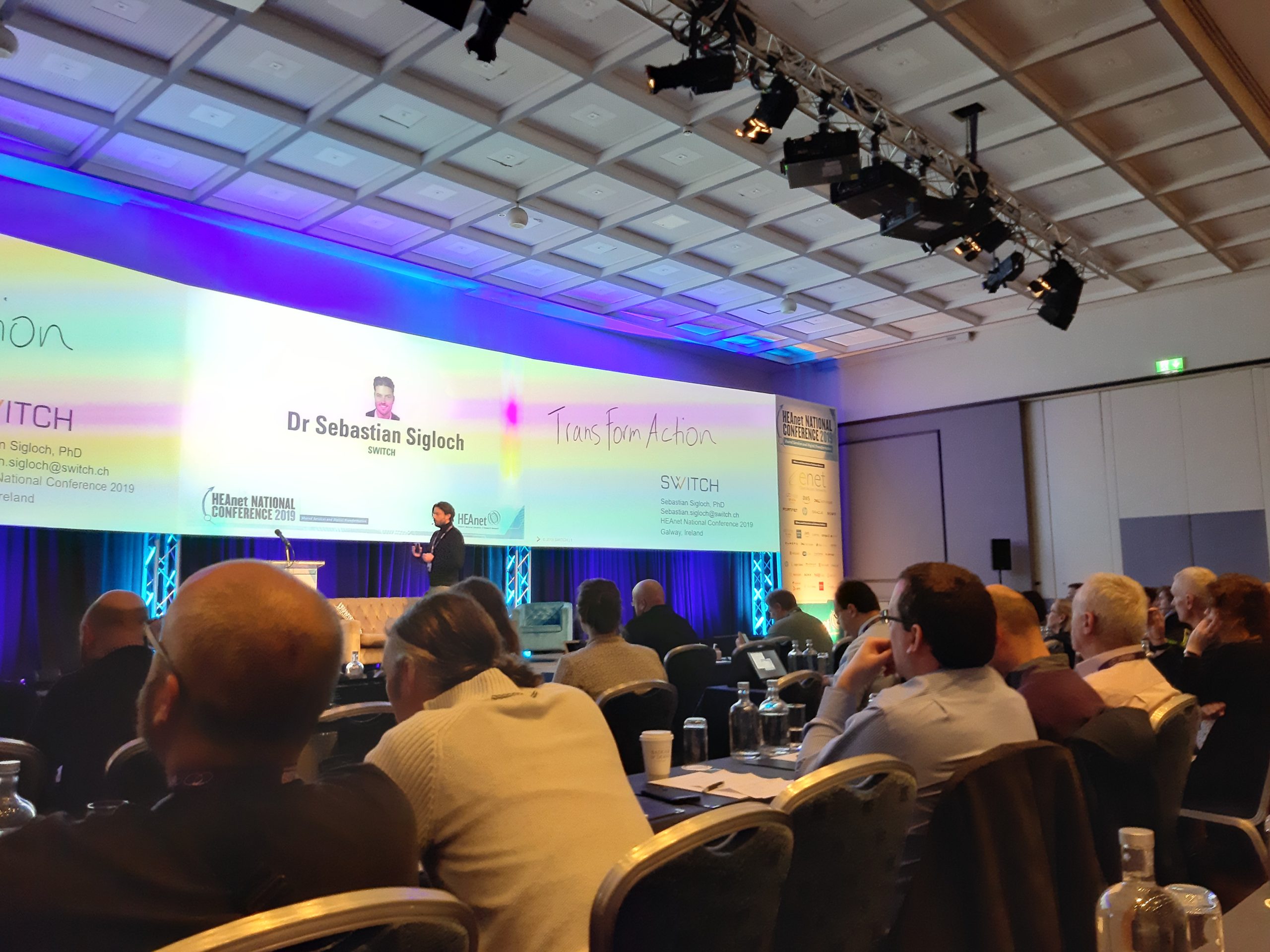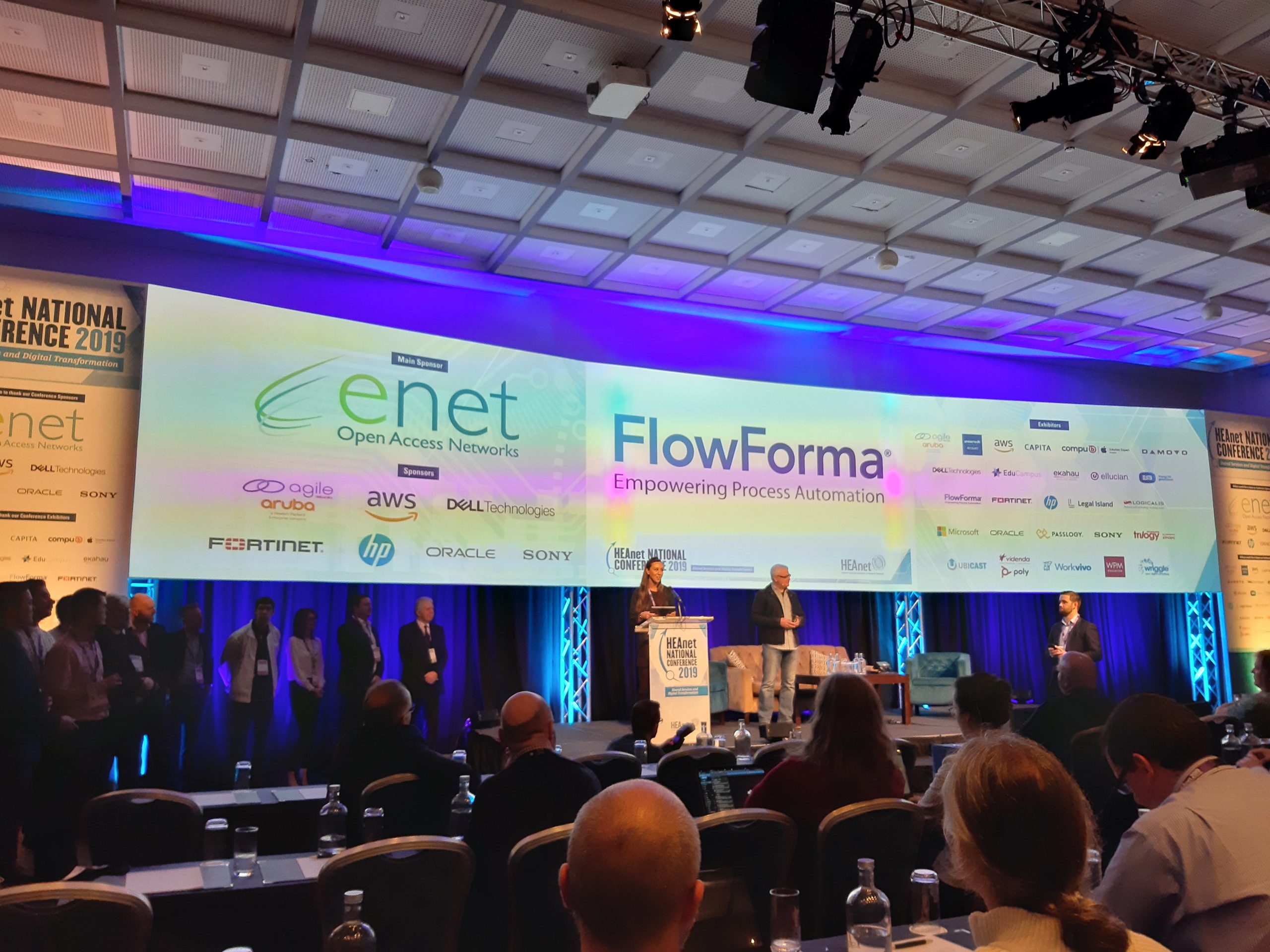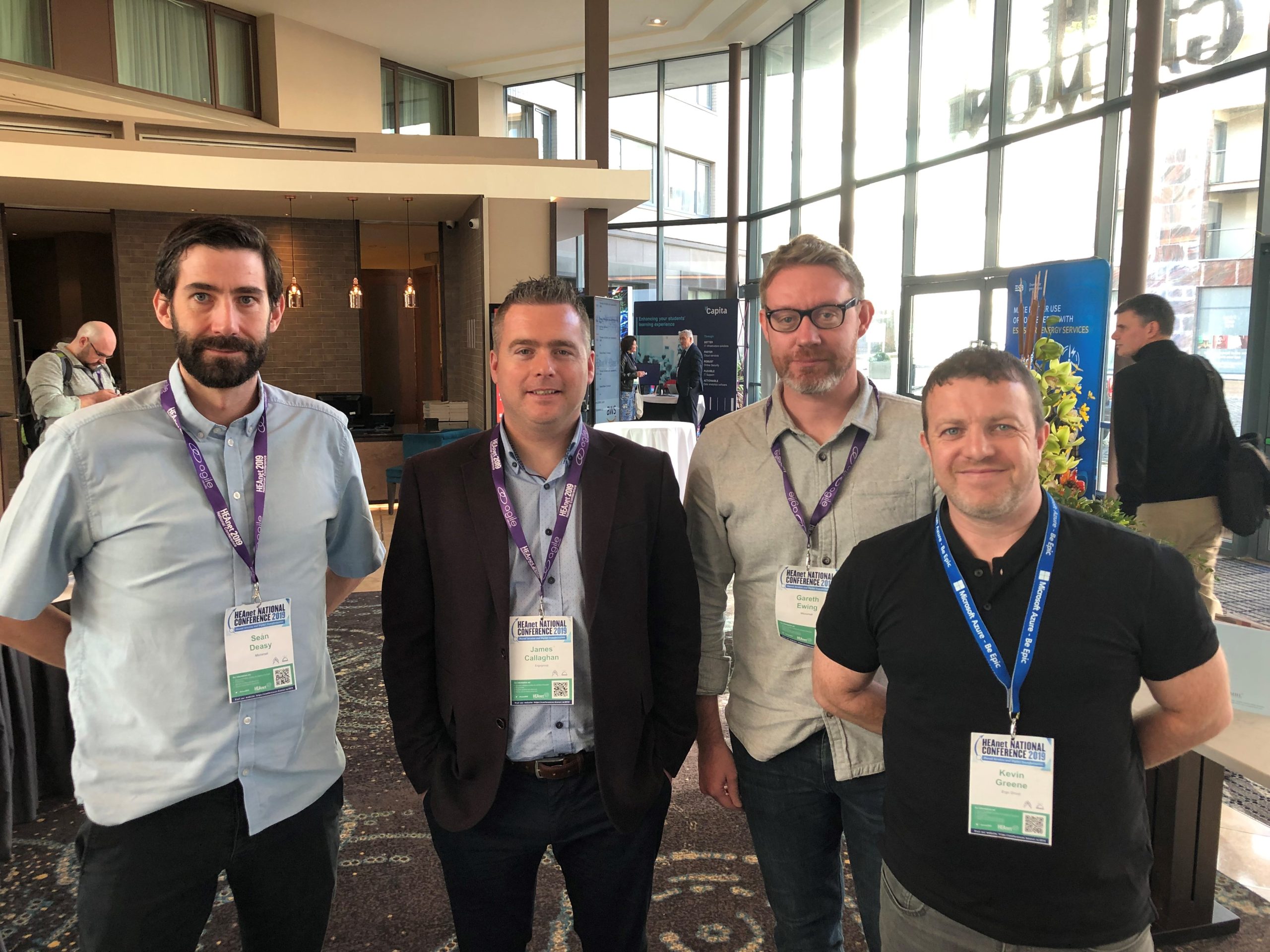Month: December 2019
With Christmas fast approaching now is a good time to reflect on last month’s HEAnet Conference in Galway.
Expertly curated and managed by the HEAnet team as always, this year’s focus was “Shared Services & Digital Transformation”, bringing together a balanced mix of industry solutions and real-world stories from Higher and Further Education. After the opening remarks by Seán Canney TD and HEAnet CEO Kerrie Power, we explored the challenges of building collaborative research practices in Swiss institutes (including CERN).

Sebastian Sigloch, SWITCH
Throughout the day we heard real world stories about unlocking the potential of the Office 365 stack across heterogenous organisations, as well as using Microsoft technologies to protect from malicious attacks. Cork Institute of Technology gave a very timely talk entitled “The Cost of an Office 365 Breach in an Educational Organisation” which covered the steps they have taken to mitigate against future attacks which included taking an in-dept look at their complete Azure MFA rollout, putting in place conditional Access rules and awareness campaigns have been introduced.
The HEAnet Conference is always a great place to see new technologies and hear from Irish success stories. Micromail was were very happy to see our friends in FlowForma have a presence at the conference for the first time and there was a great deal of interest on their “no code” Process Automation solution.

Ursula Cullen, FlowForma
The whole event was a great success as usual and was a great chance to meet with people who we have worked with remotely all year. This year we took the opportunity to co-ordinate with our Ergo colleagues (Kevin Greene and James Callaghan), running an Azure Cost Management in advance of the Conference. We then followed up onsite with 1:1 meetings where we could explore individual challenges and offer advice on Governance and Cost Management. HEAnet make all the talks and slides available to view here https://conferences.heanet.ie/2019/talk.

Sean, Gareth , Kevin and James from Micromail and Ergo.
If you would like to hear from the team here on how to optimise your Azure Cost Management, or any of the other topics touched on above, please feel free to reach out today – sean@micromail.ie.
As Microsoft makes more changes to the way products and services are licensed, you can almost hear the collective groans of customers already bamboozled by complex software terms. The company’s agreements are fast running out of letters – EA, CSP, MCA, MPSA – in programs that create more confusion that clarity.
The Enterprise Agreement (EA) has been Microsoft’s long-standing volume licensing program for organisations with 500 or more users, or devices that want to standardise on certain products. With its three-year terms, it has provided some certainty around spend and the ability to access new technologies, but changes were inevitable as more organisations migrate to the cloud and subscription services.
When cloud first entered the IT lexicon over a decade ago, it was synonymous with a new kind of simplicity that never really materialised. Just as software-as-a-service models evolved that proved more complicated than their on-site predecessors, so too did the licensing agreements wrapped around them.
While the migration to Microsoft platforms like Office 365, Dynamics 365 and Azure inevitably affect licensing positions, it’s not as simple as accommodating one-way traffic to the cloud. Most customers have one foot in the traditional on-premise world and the other in new cloud services, resulting in a hybrid combination of public, private and on-premise solutions.
Licences for a hybrid world
Consuming hybrid IT services makes the idea of a one-subscription per Office 365 user problematic. First, the Microsoft Products and Services Agreement (MPSA) was introduced, followed by the Cloud Solution Provider (CSP) program to address the challenges of running software on and off premise, but the devil’s in the detail.
There is a rabbit warren of complexity around Office 365 alone. For example, a tenant-level service is one that can be purchased as a standalone or as part of Office 365, or Microsoft 365 plans, and is activated in part or in full for all users in the tenant. A common example would be Azure Advanced Threat Protection (ATP). Purchase just a single standalone ATP plan and it will be activated for all users. The risks that Office 365 tenant-level services pose from a licensing and compliance point of view are obvious.
Similarly, when Microsoft releases new products and services within an Office 365 plan, they tend to be turned on for users by default. This causes headaches for IT and procurement as services that may not have been fully vetted are automatically available to all users. The loss of control is a real concern for businesses already struggling to maintain governance in a post-GDPR world.
The EA is still the best route for many organisations to take but be sure and check the small print. Deployment Planning Services benefits are being retired from volume licensing Software Assurance Benefits (SAB) agreements, and new, modern skilling programs introduced. Microsoft is also adjusting the eligibility criteria of 24×7 support and aligning to a new Unified Support offering. You need to understand your exact entitlements and their relevance to your environment.
Sometimes it’s about picking through the terms and conditions to identify the value. With Azure Hybrid Use Benefit, customers can run Windows virtual machines on Azure at a lower rate, but they must have Software Assurance for Windows Server to realise the cost savings. Further reductions can be made by prepaying compute capacity on a one or three-year term with reservation pricing. There is a lot to understand and think about.
Third-party expertise
There are so many ramifications and pitfalls that it’s impossible for organisations to stay on top of licencing changes. Adding further complexity is Microsoft End of Support (EOS) implications, which force organisations to identify application replacements as security updates and product enhancements are discontinued. The challenge of auditing internal requirements and keeping track of application lifecycles is compounded by the task of aligning investments to Microsoft’s constantly evolving agreements.
As a Microsoft licensing partner with over 30 years’ experience in matching client needs to vendor agreements, Micromail can identify the correct agreement type, whether it happens to be an EA, CSP, or both. As well as giving independent advice, we can also provide context. partnering with our parent company Ergo, we provide one step in an end-to-end service that spans licensing, migration, deployment and the option of managed services.
Software licensing has become strategic in the age of hybrid IT. Take a big picture view and you will have more chance of making the right choices and optimising your investments.
Find out more about our Microsoft services here.